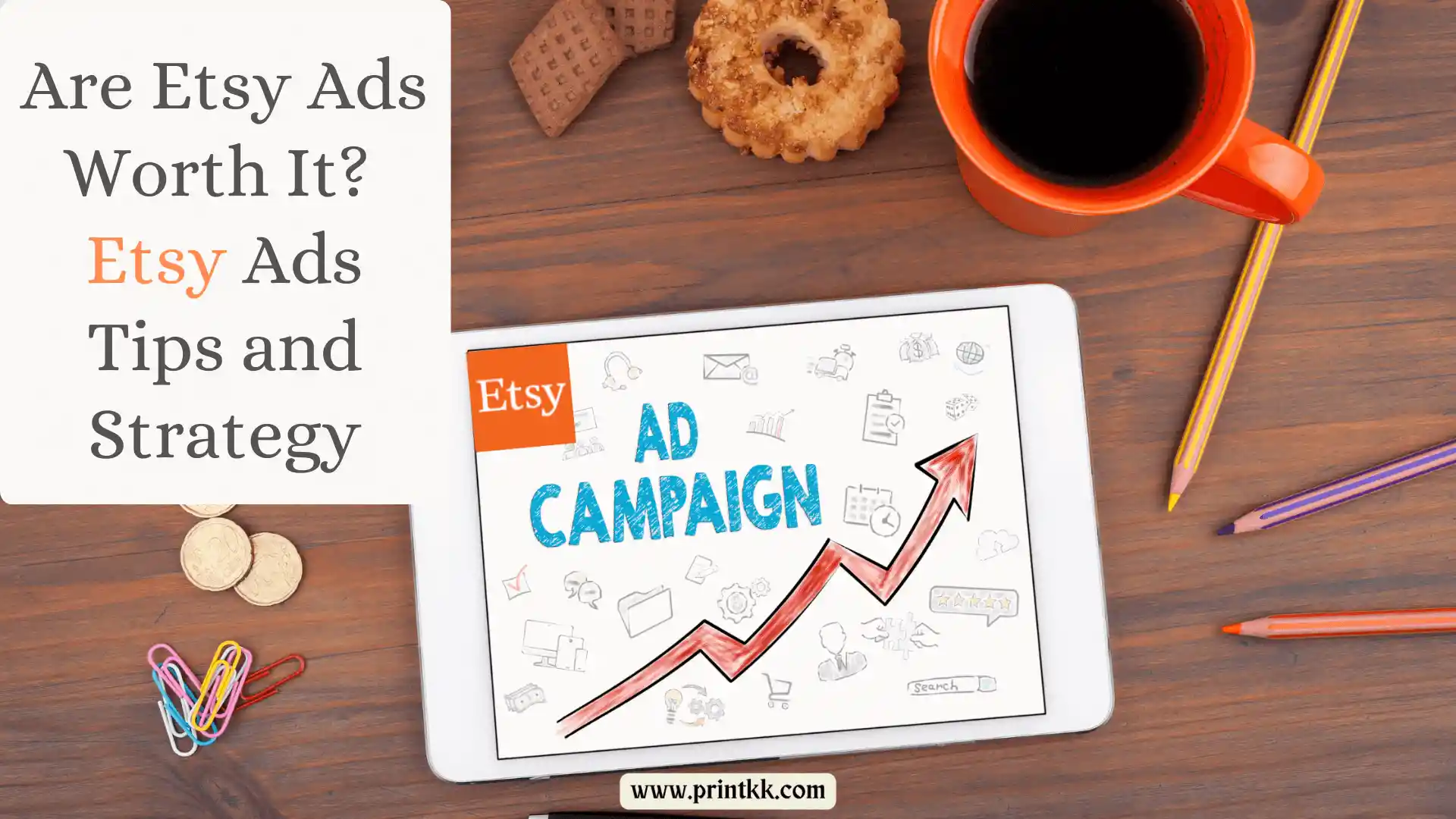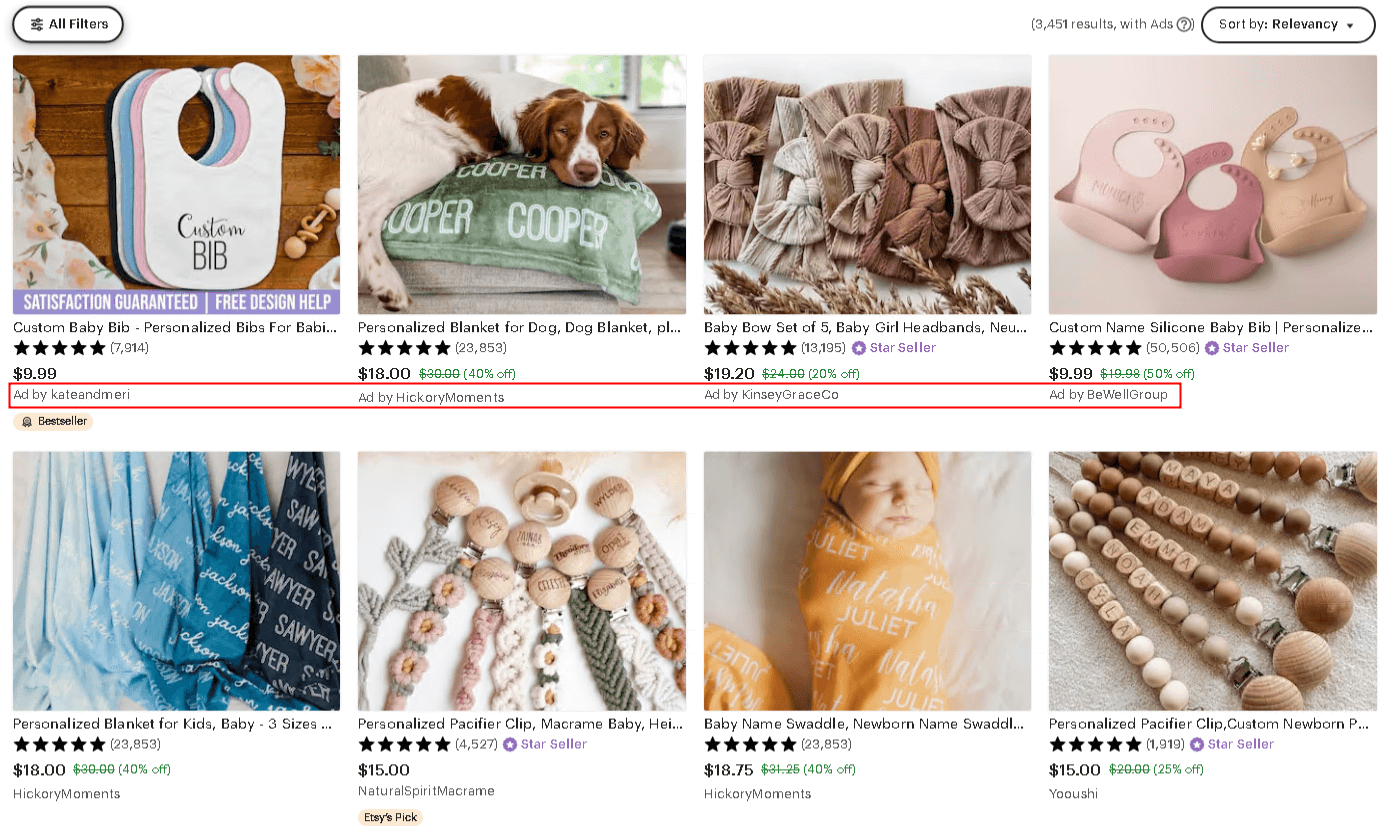
Navigating the realm of Etsy can be a challenge, particularly when deciding if investing in Etsy ads is the right move for your business. In this comprehensive guide, we'll explore the intricacies of Etsy ads, weighing their benefits against potential drawbacks.
Whether you're a budding entrepreneur, a seasoned artist, or a small business owner, understanding the effectiveness, costs, and strategies of Etsy ads is crucial. Join us as we unravel the complexities of Etsy advertising, providing you with the insights needed to determine if these ads are the golden key to boosting your sales and visibility on this popular platform.
Of course, if you can't wait to get to know the huge number of high-quality custom products, join PrintKK now and enjoy the personalized experience! Get our exclusive $5 coupon and save on your first order!

Introduction
Determining whether Etsy ads are worth the investment is a critical question for entrepreneurs, designers, and small business owners. Etsy, as a unique marketplace for handmade and vintage items, offers a competitive space where standing out can be challenging.
Etsy ads aim to increase visibility by featuring your products in prominent spots across the platform. This increased exposure can be invaluable for new shops seeking to establish a foothold or for existing shops looking to expand their reach.
However, the effectiveness of Etsy ads largely depends on several factors, including the nature of your products, your target audience, and how well you have optimized your listings.
For some, the return on investment from Etsy ads is significant, driving substantial traffic and sales. For others, the results might be less impactful, especially if their market niche is highly saturated or if their listings aren't fully optimized for Etsy's search algorithm.
In essence, Etsy ads can be a powerful tool, but their success is not one-size-fits-all and requires careful consideration and strategic implementation.
What Are Etsy Ads?
Etsy Ads are a paid advertising feature offered by the Etsy platform, designed to enhance the visibility of products listed by sellers. These ads are particularly beneficial for shop owners aiming to boost their product reach beyond organic search results. When a seller opts for Etsy Ads, their listings appear in prime spots across Etsy's site, including in search results and category pages, giving them a competitive edge in a crowded marketplace.
Using Etsy Ads involves a financial commitment, as sellers set a daily budget for their campaigns. This budget determines how often the ads appear, with Etsy using a cost-per-click model. This means sellers pay each time a potential customer clicks on their ad.
One of the key advantages of Etsy Ads is the ability to target specific audiences, increasing the likelihood of reaching customers genuinely interested in the products offered.
However, the effectiveness of these ads can vary depending on factors like the uniqueness of the product, market competition, and the quality of the listing itself, including photos and product descriptions.
For businesses looking to expand their customer base or boost sales of specific items, such as shirts or mugs, Etsy Ads can be an effective tool when used strategically.
How Etsy Ads Work?

Understanding how Etsy Ads work is crucial for anyone considering this investment to enhance their shop's visibility. Etsy Ads function on a cost-per-click basis, meaning you pay each time a potential customer clicks on your ad. Here's a breakdown of the process:
- Setting Up an Ad Campaign:
You begin by selecting the listings you want to advertise. Etsy then automatically generates ads for these listings.
- Budget Allocation:
You set a daily budget for your ads. This budget caps the amount you're willing to spend each day on ad clicks.
- Ad Placement:
Etsy displays these ads in various high-visibility areas, including search results and category pages. The placement is determined by Etsy's algorithm, considering factors like relevancy and your budget.
- Performance Tracking:
Etsy provides tools to track the performance of your ads. This includes data on views, clicks, and sales generated from your ads, helping you understand your return on investment.
- Optimization:
Based on the performance data, you can adjust your ad strategy. This might involve changing the listings you're advertising, modifying your budget, or tweaking your listings for better performance.
Etsy Ads can significantly enhance shop visibility. However, achieving success with these ads requires thoughtful strategy, an understanding of one's unique market, and continuous monitoring and adjustment of the campaigns.
Different Types of Etsy Ads
Etsy offers two main ad types to sellers: Etsy Ads and Offsite Ads, each serving different advertising objectives.
Etsy Ads:
Purpose: These ads are designed to increase visibility within the Etsy platform.
Placement: They appear in prominent spots such as Etsy search results and category pages.
Control: Sellers have control over which listings they want to advertise and can set a daily budget.
Cost Model: Etsy Ads operate on a cost-per-click model, meaning you pay only when a potential buyer clicks on your ad.
Target Audience: These ads target Etsy users who are already browsing the site, making them highly relevant to the Etsy community.
Offsite Ads:
Purpose: Aimed at reaching potential buyers outside of Etsy, these ads help in attracting a broader audience.
Placement: These ads appear on major search engines, social media platforms, and other websites outside of Etsy.
Automatic Participation: Sellers are automatically enrolled in Offsite Ads, but those making less than $10,000 a year in sales can opt out.
Cost Model: Sellers are charged a fee only when a sale is made through an offsite ad, making it a cost-effective option for many.
Benefit: Offsite Ads expand the reach of your products beyond Etsy, attracting customers who may not be regular Etsy users.
Grasping the distinctions between these ad types is essential for Etsy sellers, as each offers unique benefits and targets different audiences. While Etsy Ads are geared towards enhancing visibility within the Etsy marketplace, Offsite Ads are designed to attract potential customers from external platforms and search engines.
The selection between these ad types should be aligned with your specific marketing objectives, budget considerations, and the target audience you intend to capture.
Benefits of Running Ads on Etsy
Running Etsy ads can offer several advantages for enhancing the visibility and sales of your products. These benefits, combined with insights from various Etsy sellers, paint a comprehensive picture of the potential of Etsy ads:
- Enhanced Visibility:
Etsy ads significantly increase the visibility of your products. They appear in prominent spots within Etsy, such as in search results and category pages, making your items more likely to be seen by potential buyers. As experienced by OaklandDrive, a modest investment in ads led to a noteworthy increase in sales, demonstrating the potential impact of improved visibility.
- Targeted Reach:
The platform allows your ads to reach customers already interested in similar products. This targeting can lead to higher conversion rates, as the audience is more likely to be receptive to your offerings.
- Initial Boost for New Products:
Etsy ads can effectively gain initial traction for new listings. They help accumulate early views and favorites, crucial for organic ranking on Etsy. This is echoed by stickersbysarahe, who highlighted the importance of high-quality product photos, suggesting that combining ads with strong presentation can enhance the effectiveness of your campaigns.
- Flexible Budgeting:
You have the control to set and adjust your daily ad budget, allowing you to manage costs while experimenting with different advertising strategies.
However, it's important to note that success with Etsy ads varies and isn't guaranteed. Factors like product type, market competition, and your shop's overall appeal play significant roles. Some sellers, like Etsyrenegade, advise focusing on building a solid sales base before investing heavily in ads, indicating that Etsy ads might be more effective for shops that have already established a certain level of success.
While Etsy ads can be a powerful tool for increasing visibility and sales, their effectiveness is influenced by several factors, including the quality of your listings and the strategic integration of ads with other marketing efforts. It's recommended to use Etsy ads as part of a broader marketing strategy for the best results.
How Much Do Etsy Ads Cost?
The cost of Etsy ads varies depending on whether you choose onsite or offsite ads, and there are distinct factors to consider for each type.
Onsite Ads:
- These ads typically cost between $0.2 and $0.5 per click.
- You're charged only when a visitor clicks on your Etsy ad.
- You can set up a maximum daily budget for your ads, but the minimum amount is determined by Etsy.
- Pausing or stopping your ads will still incur charges for any clicks that occurred up to that point.
Offsite Ads:
- These ads appear on external websites and platforms, including search engines and social media.
- You have less control over offsite ads, as you can't change the listings to promote or the budget.
- You are only charged for offsite ads when a sale is made after a shopper clicks on the ad.
- Etsy charges a commission of 12% to 15% of the total sale for successful offsite ads.
- Sellers making less than $10,000 a year can opt out of offsite ads, while those who earn more than this amount are automatically enrolled and cannot opt out.
For onsite ads, you can adjust which countries' shoppers can see your ads, based on the countries you ship to, by modifying your shipping profiles. For offsite ads, this control is not available.
Etsy ads can be a valuable tool for increasing visibility and sales, especially for shops selling higher-priced items or those looking to boost specific listings with competitive keywords. However, it's essential to monitor your ad performance and adjust strategies accordingly to ensure a good return on investment.
Are Etsy Ads Worth It?
Determining whether Etsy ads are worth the investment hinges on various factors specific to each Etsy shop. Generally, Etsy ads can offer considerable advantages, especially for certain types of shops and products.
Here are a few points to consider:
- Boost in Visibility and Sales:
Etsy ads can significantly enhance the visibility of your products within the Etsy marketplace. This increased exposure often translates into higher sales, particularly for products with broad appeal or in niche markets.
- Tailored for Different Needs:
Etsy ads can be tailored to suit the unique needs of your shop. Whether you're a new entrepreneur trying to gain traction or an established brand looking to expand your reach, Etsy ads offer customizable options to match your goals.
- Cost-Effectiveness:
With Etsy ads, you have control over your budget, allowing you to manage costs effectively. This makes it a potentially lucrative option for businesses of all sizes.
While the effectiveness of Etsy ads varies, many shop owners have found them to be a valuable tool for growing their business. It's recommended to approach Etsy ads with a clear strategy, considering factors like your target audience, the nature of your products, and the competition in your niche. Combining Etsy ads with other marketing efforts, such as social media promotion and SEO, can also enhance their effectiveness.
Ultimately, whether Etsy ads are worth it depends on your shop's specific circumstances and how well you leverage the platform's advertising tools. Experimenting with a small budget can be a good way to gauge their effectiveness for your particular business.
10 Tips and Tricks for Successful Etsy Ads

To achieve success with Etsy Ads, several key strategies and best practices can be employed. These tips are based on insights from experts and successful sellers:
Focus on High-Converting Products
Advertise your bestsellers first, as they are more likely to attract clicks and sales. Then, consider promoting mid-range products. Regularly check and deactivate any promoted listings that are not converting, especially those with high views but no sales.
Set a Realistic Budget
Begin with a modest budget and adjust based on the performance of your ads. Ensure that the cost of the ads does not exceed your profit margin.
Use High-Quality Images and Compelling Descriptions
Eye-catching product photos and engaging descriptions can significantly improve the performance of your ads. They should clearly communicate the value and appeal of your products to potential buyers.
Optimize for Etsy's Algorithms
Understanding Etsy's search and recommendation algorithms can help in optimizing your listings for better visibility. This includes using relevant keywords, ensuring high-quality listings, and keeping your offerings up-to-date.
Experiment and Adjust
Test different ad variations to see what resonates best with your audience. Analyze the performance data to continually refine your strategy.
Leverage Offsite Ads Wisely
If your profit margins are sufficient to absorb the 12-15% fee, offsite ads can be a useful tool. Remember, you only pay when a sale is made through these ads.
Create Seasonal Items
Offering special versions of popular items during holidays like Christmas, Halloween, and Easter can boost sales during these periods.
Branding and Customer Experience
Developing a strong brand identity and positive customer experience can set your shop apart from competitors and foster customer loyalty.
Email Marketing and Customer Retention
Engage with your customers through email marketing to build long-term relationships and encourage repeat purchases.
Product Bundling and Customization
Bundling products and offering customization options can increase order sizes and appeal to a wider range of customers.
It's important to bear in mind that the success of Etsy ads can vary widely between shops. Maintaining flexibility, closely monitoring ad performance, and making necessary adjustments are key to maximizing the benefits of your Etsy ad campaigns.
Disadvantages of Etsy Ads
While Etsy Ads can offer significant benefits, certain drawbacks are worth considering:
- Limited Control and Customization:
A point raised by PMMeLifeTips is the limited control sellers have over their Etsy ad campaigns. They state, "All you can do is set a budget and which products to include, but you can't set a maximum CPC of the items, or anything of that nature." This lack of detailed control can be a major constraint for sellers who wish to fine-tune their advertising strategies.
- Effectiveness Compared to Other Marketing Strategies:
The effectiveness of Etsy Ads relative to other marketing strategies can vary. Wildernessinabox suggests that ads might not always be the most effective way to reach potential customers. This perspective is important to consider, especially when planning a marketing strategy that balances various channels and approaches to reach your target audience effectively.
These insights from Etsy sellers indicate that while Etsy Ads can be beneficial, they come with certain limitations. Sellers should carefully consider these drawbacks, particularly the limited control over ad campaigns and how Etsy Ads compare with other marketing strategies, to determine if this advertising method aligns with their business goals and marketing plans.
When to Invest or Avoid in Etsy Ads?
Deciding when to invest in or avoid Etsy ads can be a complex decision, but understanding their intricacies and aligning them with your business strategy can help. Based on the insights gathered from various sources, here's a guide to navigating the decision:
When to Invest in Etsy Ads:
- Boosting Visibility for Higher Priced Items:
Etsy ads can be particularly beneficial for items with a higher profit margin. As LittleFlairTee shared, "I have very minimal success with Etsy Ads. I would only recommend it if the items being sold generates $10+ in profit." This suggests that Etsy ads might be more worthwhile for products that can absorb the ad costs while still maintaining a healthy profit margin.
- Gaining Initial Exposure for New Shops:
Newer shops trying to build their presence on Etsy might find ads helpful as an initial boost to gain visibility and early reviews, crucial for long-term success.
- Data-Driven Insights:
Using Etsy ads accelerates the process of collecting valuable data on customer behavior, such as views, favorites, sales, and reviews. This information can be crucial in refining your marketing strategy and improving your listing's performance.
- Competitive Keywords:
If your products use keywords that are highly competitive and difficult to rank organically, paying for Etsy ads might be a strategic move to enhance visibility in search results.
When to Avoid Etsy Ads:
High Costs Relative to Profit: If the costs of the ads significantly eat into your profit margin, particularly for low-priced items, it might not be a cost-effective strategy.
Already Successful Organic Reach: If your listings already rank well organically and appear on the first page for relevant keywords, Etsy ads might not add much additional value. In such cases, focusing on further optimizing your listings and creating new ones based on demand could be more beneficial.
Limited Budget Control: Remember, Etsy ads, particularly offsite ads, offer limited control over budget and targeted listings. If you're looking for more granular control over your ad spend, this might be a limiting factor.
Balancing these considerations is key. While Etsy ads can provide a boost, particularly for higher-priced items or new shops, they might not be the best investment for every seller. Whether to invest in Etsy ads should be based on a careful analysis of your shop's needs, your product pricing, and how much control you want over your advertising efforts. Testing with a small budget initially can be a good strategy to gauge the effectiveness of Etsy ads for your specific circumstances.
How to Turn Off Etsy Ads?
Turning off Etsy Ads can be a strategic decision, especially if you're evaluating their effectiveness or adjusting your marketing budget. Here's a guide to help you navigate this process:
Accessing Etsy Ads Settings:
- Navigate to your Etsy shop dashboard.
- Click on the 'Marketing' tab.
- Select 'Etsy Ads' from the options available.
Pausing or Stopping Your Ads:
- Within the Etsy Ads section, you'll find an option to pause or stop your ads.
- Choose 'Pause your ads' to temporarily stop them. This can be useful if you want to assess their impact or make changes to your strategy.
- To permanently stop your ads, select 'Turn off ads'. This action will discontinue your ad campaigns.
It's important to note that any clicks your ads receive up to the point they are paused or stopped will still be charged. Therefore, it's advisable to monitor your ad performance closely before making the decision to pause or stop your campaigns.
For sellers considering turning off their Etsy Ads, it's essential to weigh this decision against their overall marketing strategy and business goals. Pausing ads can be a useful approach for temporary adjustments, while turning them off might be more suitable if you're planning a significant shift in your marketing efforts or if you find that the ads are not meeting your expectations in terms of return on investment.
Conclusion
In concluding our exploration of Etsy ads, it's evident that their value largely depends on individual business strategies and the specific circumstances of each Etsy shop. Sellers like LittleFlairTee highlight the importance of considering profit margins when investing in Etsy ads, suggesting they may be more beneficial for higher-priced items.
Concerns raised by PMMeLifeTips and Wildernessinabox about the limited control and effectiveness of ads in certain contexts suggest a more cautious approach. These insights underscore the need for a balanced and strategic use of Etsy ads, tailored to the unique needs of each shop.
Ultimately, whether Etsy ads are worth the investment is not a one-size-fits-all answer. Factors such as product pricing, shop visibility, and the ability to absorb ad costs play crucial roles in determining their effectiveness. For some, Etsy ads may offer a valuable boost in visibility and sales, while for others, focusing on organic growth and alternative marketing strategies might yield better results.
It's advisable for Etsy sellers to evaluate their specific situation, test ads with a modest budget, and continuously monitor their performance to make informed decisions about their advertising strategies.
FAQs
Do Etsy ads boost sales?
Etsy ads can boost sales by increasing product visibility, especially for items with high profit margins or in competitive niches. However, success varies depending on factors like product type, shop's organic reach, and ad strategy. It's essential to monitor ad performance and adjust strategies accordingly.
Is it worth spending money on Etsy ads?
Spending money on Etsy ads can be worth it for increasing visibility and attracting potential buyers, particularly for unique or high-margin items. However, effectiveness varies based on product type and market competition. It's advisable to start with a modest budget and adjust based on performance metrics.
Should I use Etsy ads on new shop?
Using Etsy ads for a new shop can be beneficial for gaining initial exposure and building an early customer base. However, it's important to balance ad spend with profit margins and continuously evaluate the ads' effectiveness in driving sales and attracting targeted customers.
How long should I run Etsy ads?
The duration for running Etsy ads should be based on monitoring their performance. Start with a trial period of a few weeks to gather data, then adjust based on results. Continuous evaluation is key to determining the optimal timeframe for your specific products and target market.
When should I stop ads on Etsy?
Consider stopping Etsy ads when they consistently yield low returns on investment, don't align with your budget, or if your products achieve strong organic reach and sales. Regularly review ad performance metrics to make informed decisions about continuing or halting your ad campaigns.
How much do Etsy ads cost per click?
The cost per click for Etsy ads typically ranges from $0.2 to $0.5, but it can vary based on the product category, competition, and market trends. It's important to set a budget that aligns with your profit margins and continuously evaluate the ad performance for cost-effectiveness.
The cost per click for Etsy ads typically ranges from $0.2 to $0.5, but it can vary based on the product category, competition, and market trends. It's important to set a budget that aligns with your profit margins and continuously evaluate the ad performance for cost-effectiveness.










 Made in USA
Made in USA


 Global Shipping
Global Shipping



























